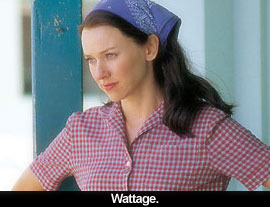WILLIAM SHAKESPEARE'S THE MERCHANT OF VENICE
*½/**** Image A Sound A Extras B+
starring Al Pacino, Jeremy Irons, Joseph Fiennes, Lynn Collins
screenplay by Michael Radford, based on the play by William Shakespeare
directed by Michael Radford
THE ASSASSINATION OF RICHARD NIXON
**/**** Image B+ Sound B+
starring Sean Penn, Naomi Watts, Don Cheadle, Jack Thompson
screenplay by Niels Mueller & Kevin Kennedy
directed by Niels Mueller
 by Walter Chaw As we comb through the continuing fallout of the Bush Jr. administration's first term, themes begin to assert themselves on our movie screens as clear as the words of prophets written on tenement halls. Colorized misogyny and race-baiting spectacles share time with protest pictures that are oftentimes more strident and dogmatic than the party line–it's the Eighties neo-Cleavers at war with postmodern B-pulpers, which many moons ago manifested themselves as one of the most fertile periods in the history of science-fiction and now resurface as part of a new wave of existential science-fiction. We're all about Blade Runner these days, deep into Philip K. Dick territory where memories and dreams are manipulated and franchised for you dirt-cheap. Images have become the jealous currency traded in the underground of a land where one sad breast was flashed in the middle of our annual orgy of violence, sex (sometimes incestual, lesbian sex as sold by primogenetic neocon Pete Coors–"And twins!"), and unrestrained plea for/rewarding of mass consumption. It was enough to send my beloved nation's vocal demographic of selectively pious idiots into paroxysms of…what? Outrage? Righteousness? I don't know. What I do know is that in the United States, it ain't the suggestion of sex, it's the actual, pale, flaccid appendage that feeds the sometimes-joyous result of sex that offends. Women need to be protected from showing the outsides of their bodies in the same way they need to be protected from having a say in what happens to the insides of their bodies in the same way they need to be prevented from reading, voting, or holding a job. When a society gets really frightened, see, we must protect people from themselves. Let's start at the girls and the darkies and work our way up.
by Walter Chaw As we comb through the continuing fallout of the Bush Jr. administration's first term, themes begin to assert themselves on our movie screens as clear as the words of prophets written on tenement halls. Colorized misogyny and race-baiting spectacles share time with protest pictures that are oftentimes more strident and dogmatic than the party line–it's the Eighties neo-Cleavers at war with postmodern B-pulpers, which many moons ago manifested themselves as one of the most fertile periods in the history of science-fiction and now resurface as part of a new wave of existential science-fiction. We're all about Blade Runner these days, deep into Philip K. Dick territory where memories and dreams are manipulated and franchised for you dirt-cheap. Images have become the jealous currency traded in the underground of a land where one sad breast was flashed in the middle of our annual orgy of violence, sex (sometimes incestual, lesbian sex as sold by primogenetic neocon Pete Coors–"And twins!"), and unrestrained plea for/rewarding of mass consumption. It was enough to send my beloved nation's vocal demographic of selectively pious idiots into paroxysms of…what? Outrage? Righteousness? I don't know. What I do know is that in the United States, it ain't the suggestion of sex, it's the actual, pale, flaccid appendage that feeds the sometimes-joyous result of sex that offends. Women need to be protected from showing the outsides of their bodies in the same way they need to be protected from having a say in what happens to the insides of their bodies in the same way they need to be prevented from reading, voting, or holding a job. When a society gets really frightened, see, we must protect people from themselves. Let's start at the girls and the darkies and work our way up.

 ****/**** Image
****/**** Image  by Walter Chaw
by Walter Chaw